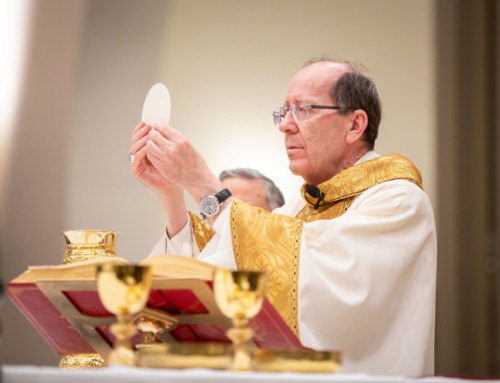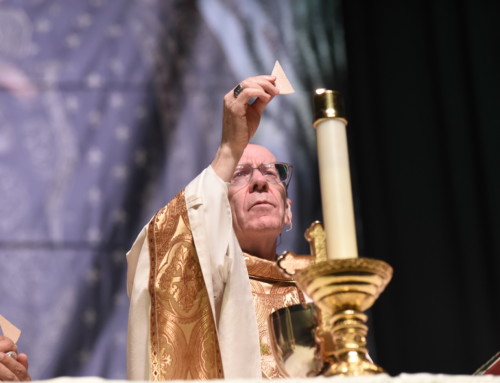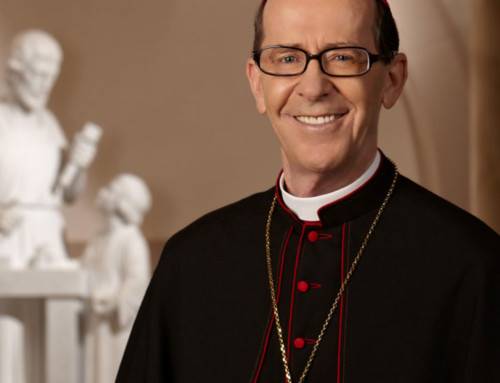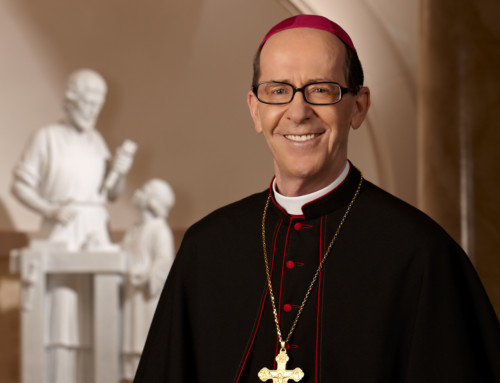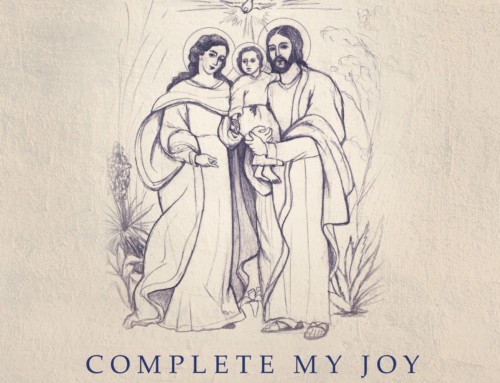This four-part series from Bishop Thomas J. Olmsted originally appeared in The Catholic Sun, newspaper of the Roman Catholic Diocese of Phoenix, between April and July of 2012. Read: Humanae Vitae, the encyclical letter of Pope Paul VI on the Regulation of Birth
Part One: Blessed is the fruit of the womb
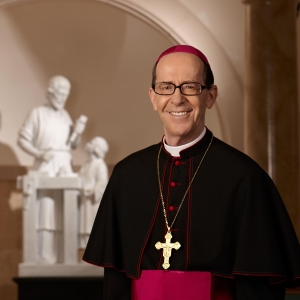
The Most Rev. Thomas J. Olmsted, Bishop of the Roman Catholic Diocese of Phoenix.
‘Hail Mary’ to the rescue!
St. Paul urges us to overcome evil with good (Romans 12:21). Here, the Church did just that. To overcome the Cathari heresy, the Church decided to require that all the faithful memorize and regularly pray the Hail Mary. In this way, each member of the Church would be proclaiming in prayer: “Blessed is the fruit of thy womb.” The Hail Mary, recited by all the Church, won the battle against the Cathari heresy, as it also lifted up the wondrous mystery of the Incarnation of the Son of God, celebrating that moment when the Lord Jesus took flesh and became one with us through Mary’s “Let it be done to me according to thy word.” This requirement to pray the Hail Mary may also explain why the rosary, which began at the same time in history through the efforts of St. Dominic and the Order of Preachers, became so popular throughout the Church, and why it continues to be a principal weapon today to overcome the culture of death and to build a civilization of love.
The fruit of the womb is holy. Every child is a blessing. A child is never an evil, even if the circumstances that led to the beginning of a new human person were not morally upright. At all times, pregnancy is a wondrous gift of God, for at the moment of conception a unique and unrepeatable human being is created by our loving God. The Lord Jesus Himself is “the fruit of the womb.” As Elizabeth said to Mary (Lk 1:42): “Blessed are you among women and blessed is the fruit of your womb.” In union with Mary’s Son, we human beings discover our own dignity and high calling.
The Immaculate Conception
Is it not more than coincidence that the bishops of the United States of America, many years ago, placed our nation under the patronage of Our Lady of the Immaculate Conception? Our national basilica in Washington, D.C., is a beautiful sanctuary bearing that title.
This great mystery of our faith draws our attention to the moment that Mary was conceived without sin in the womb of her mother. From the very first moment of her existence, God preserved her from any moral blemish so that she could be the worthy Mother of His Beloved Son, the perfect Temple of our Redeemer, so that she could immaculately conceive Jesus in her most pure womb and give birth to Him in the poverty of Bethlehem.
Mary’s Immaculate Conception teaches us the dignity of every human person at the moment of conception, no matter whether we are the poorest of the poor or the richest of the rich. Since the Immaculate Virgin Mother is the “first disciple,” the perfect example of a follower of Christ, we can be sure that the holiness God accomplished in her is a true sign of the holiness He wishes to accomplish in us. The celebration of her Immaculate Conception each year on Dec. 8 is a reminder to us of the intrinsic and inviolable good of all human life in the womb. Any argument that seeks to diminish that good by advocating contraception or abortion must be firmly rejected.
The good of children
In a recent address to American bishops in Rome for their ad limina visit, Pope Benedict XVI urged us bishops to be diligent in promoting and explaining the Church’s teaching on sexuality. In this effort, he said the Church’s key concern is “the good of children, who have a fundamental right to grow up with a healthy understanding of sexuality and its proper place in human relationships.” He went on to say that sound family life “is the surest guarantee of the intergenerational solidarity and the health of society as a whole.”
The words of our Holy Father are built upon a central teaching of the Church, expressed at the Second Vatican Council (Gaudium et Spes, #50), namely that “…children are really the supreme gift of marriage and contribute very substantially to the welfare of their parents.”
In his apostolic exhortation on marriage, Familiaris Consortio, St. John Paul II taught that parenthood is both a privilege and a responsibility in which husband and wife associate themselves in the most profound way with God in the work of procreation. They are able, he said (#28), “to serve life, to actualize in history the original blessing of the Creator — that of transmitting by procreation the divine image from person to person.”
The blessing of the Church’s teaching on marriage and family life is becoming more evident today, even as it becomes ever more urgently needed. As the Church’s teaching, found, for example, in Humanae Vitae and St. John Paul II’s Theology of the Body, spreads here in our diocese and beyond, we find grateful acceptance and recognition of this solid foundation for a joy-filled marriage. The false promises of the sexual revolution that had contraception at its core are collapsing around us. They have not brought the joy and freedom that people desired but, rather, have only enslaved and have brought about a further degradation of sexual morality and an undermining of the family. Today, a positive and ennobling understanding of sexuality and marriage is emerging on the basis of fidelity to God’s plan for marriage.
Though forms of the Cathari confusion have arisen again in our time, the Lord provides His Church with the gifts needed to counter the false and shallow attractiveness of sterility and to replace it with God’s plans for life and love.
Part Two: Openness to life and personal identity
A particularly dramatic moment of human freedom occurs in a Catholic wedding when a man and woman stand before the altar and answer three “questions of clarification” about the nature of marriage, just before the vows are exchanged.
“Have you come here freely, and without reservation?” The couple answers, Yes.
“Will you honor each other as husband and wife for the rest of your lives?” Yes.
“Will you accept children lovingly from God, and bring them up according to the law of God and His Church?” Yes.
Our postmodern culture balks: “Wait! Is the third question really necessary? Certainly, we must be all about freedom, and unconditional love, yes, and even fidelity is an attractive ideal (if not realistic for most humans), but a promise to be open to children? Is this necessary to promises of marriage?”
“Yes,” says the Church, “it is entirely necessary.” The Church does not invent the meaning of marriage — she merely protects and promotes it, in all of its natural and sacramental beauty. At the center of the beauty of marriage is the gift of children, and of being a mother and a father.
In other words, when Pope Paul VI’s encyclical of 1968, Humanae Vitae, echoes the 2,000-year teaching of the Church, “…each and every marital act must of necessity retain its intrinsic relationship to the procreation of human life,” (no. 12) more than a clear teaching against contraception is taught, though that teaching is clear and unchangeable. For those that have “eyes to see and ears to hear,” an ennobling call from our mother the Church, and therefore from Christ Himself, is heard. It is the high call to married couples to reject the stultifying, fear-based shadow of marriage encouraged by the contraceptive mentality of our age; and, instead, to embrace the fullness of the call to marriage in all its life-giving splendor and dignity.
A person’s identity and the call to be life-giving
If the choice of sterility (I am not talking here about infertility, which I will discuss in the next article) were not in some odd sense attractive, it would not be such an effective lie, and it would not be chosen by so many today. What lurks always as a temptation near the human heart is the desire to be undeterred in one’s choices by any law outside of the self.
In his 1964 play “Radiation of Fatherhood,” a dramatic reflection on the Trinity and human freedom, the future John Paul II placed in the mouth of the mysterious character Adam the following expression, “Ah, to stand apart from everything, so that I could be only within myself!” Adam, not accidentally the Biblical word for man himself, fears the call to parenthood, to bring a child into existence, because he fears the death of his ego which this entails. He fears the suffering that will of necessity accompany becoming and being a father. And yet in the play, God calls him to become who he truly is by becoming a father. It turns out that there is no other path to human fulfillment than the path of fruitfulness, of motherhood and fatherhood.
“Become who you are!” St. John Paul II was fond of repeating to priests, consecrated persons, and parents. He knew the all-too-human fear to which we are subject in living our vocations, and he knew the antidotes.
‘Love and Responsibility,’ four spousal benefits
In his philosophical work on marital love, “Love and Responsibility,” the future Polish pope was concerned with explaining how spouses can engage in the marital act of sexual intercourse without falling into using each other, a situation he calls “the internal problem of every marriage.” The key is that a couple must understand the great meaning of what they are doing, and understand the possibility of motherhood and fatherhood in each act:
“Mutual betrothed love demands a union of persons. But the union of persons is not the same as sexual union. This (union) is raised to the level of the person only when it is accompanied in the mind and the will by acceptance of the possibility of parenthood… Neither in the man nor in the woman can affirmation of the value of the person be divorced from awareness and willing acceptance that he may become a father and she may become a mother… If the possibility of parenthood is deliberately excluded from marital relations, the character of the relationship between the partners automatically changes. The change is away from unification in love and in the direction of mutual, or rather, bilateral ‘enjoyment’” (p. 228).
This quote from St. John Paul II is theologically rich; let us focus only on one specific element of it. For the marital act to truly be a personal union it must include the activity of the powers of the soul which identify us as being human: intellect and will. For the marital act to retain its full meaning the spouses must rationally accept the full potential of the act: the possibility of becoming parents (this does not negate the legitimacy of abstaining during fertile periods, when there are good reasons for doing so). To deliberately not include this possibility would be to negate one of the essential goals of the marital act and to render the entire act sinful.
Such is the pattern of contraception in a marriage, and we see it in the brokenness of countless marriages today, in the radical cultural disconnect between sex and children on display everywhere, from soap operas to abortion. As priests, we feel the weight of it in the confessional and grieve the losses.
Yet, for those who generously accept the potentiality of motherhood and fatherhood in their marital love, benefits arise which our world desperately needs. Karol Wojtyla in “Love and Responsibility” points to four personal strengths which grow in married couples who are open to life, which I have simplified somewhat from Wojtyla’s dense philosophical language:
- Awareness of the call to parenthood assists growth in self-mastery;
- Marital love flourishes when the goodness of parenthood is understood;
- Raising a child teaches one to love, to make a gift of self; and
- Married persons understand their greatness as procreators with God of a new human person.
St. John Paul II insisted that if a couple wants a virtuous, happy, generous, awe-filled marriage, they must remain open to the natural end of the consummating act of marital love, open to the possibility that a child, a new person from God, might come into being through that act.
The drama and beauty of this calling is not lost on many of our young couples currently preparing for marriage in the Diocese of Phoenix; they share their gratitude for the clarity of Church teaching and for the witness of the couples who presented it. These couples are on a path to a joy-filled marriage, which deepens like any Christian vocation authentically lived.
Part Three: The mission of married couples
In the nuptial blessing of a wedding Mass, the following words are found, “May your abundant blessing, Lord, come down upon this bride and upon her husband, her companion for life, and may the power of your Holy Spirit set their hearts aflame from on high, so that, living out together the gift of Matrimony, they may adorn their family with children and enrich the Church… let them pray to you in the holy assembly and bear witness to you in the world.” Notice how the nuptial blessing points towards the mission of the newly married couple, a mission designed by God and a key part of the New Evangelization.
In the previous parts of this series, we considered how the identity of each spouse, as a man or as a woman and also as a follower of Christ, is reinforced when the couple lives their sexual relationship in a manner always open to the possibility of motherhood and fatherhood. This openness to life produces a fourfold blessing for the couple:
- growth in self-control
- growth in marital joy
- growth in the ability to love — i.e. the ability to make a gift of self, and
- growth in awe at the great honor of being procreators with God of new human persons.
This growth in cooperating with God in giving love and life is designed to produce married saints. It is the way that husbands and wives fulfill a mission for Christ in the world.
In this third part of the series, I shall focus on the humble yet vital mission of fruitfulness to which Christian married couples are called by God.
Go (be married) and make disciples
In his apostolic exhortation on the family, Familiaris Consortio, St. John Paul II pointed to the specific way that Christian spouses and their children (Cf. Mt 28:18) “go forth and make disciples,” i.e. how they fulfill their mission in the world (#50): namely by “participation in the prophetic, priestly and kingly mission of Jesus Christ and of His Church.”
The Christian family shares in Christ’s priestly mission by forming a believing community, where faith grows through the sacraments, prayer and sacrifice. As the late Holy Father wrote (Idem, #55), “…the Christian family is continuously vivified by the Lord Jesus and called and engaged by Him in a dialogue with God through the sacraments, through the offering of one’s life, and through prayer.”
They share also in the prophetic mission of the Lord Jesus by forming an evangelizing community, helping one another personally to encounter Christ and to deepen their knowledge of Him in the Church. As St. John Paul II wrote, “…the sacrament of Marriage takes up and re-proposes the task of defending and spreading the faith, a task that has its roots in Baptism and Confirmation, and makes Christian married couples and parents witnesses of Christ ‘to the ends of the earth,’ missionaries… of love and life” (Idem, #54).
The kingly mission of the Christian family
The Christian family shares as well in the kingly mission of Christ, as it imitates Him “who came not to be served but to serve.” Kingly service of others begins with governance of oneself and of one’s passions and desires. Self-governance, aided by the Holy Spirit, brings true growth in the freedom to put the interests of others ahead of one’s own, beginning with one’s spouse, then one’s children.
It is instructive to remember that Jesus taught the Apostles to serve others by directing their attention to a little child (Mk 9: 35-36), “So He sat down and called the Twelve around Him and said, ‘If anyone wishes to rank first, he must remain the last one of all and the servant of all.’ Then He took a little child, stood him in their midst, and putting His arms around him, said to them, ‘Whoever welcomes a child such as this for my sake welcomes me. And whoever welcomes me welcomes, not me, but Him who sent me.”
In his encyclical “Charity in Truth” (#28), Pope Benedict reminded us of the vital need in society today for the witness of openness to life that Christian married couples offer to the world, “Openness to life is at the center of true development. When a society moves toward the denial or suppression of life, it ends up no longer finding the necessary motivation and energy to strive for man’s true good. If personal and social sensitivity toward the acceptance of a new life is lost, then other forms of acceptance that are valuable for society also wither away.” A society that cherishes children has a future. One that adopts a contraceptive mentality leaves as its legacy a culture of death.
Dealing with infertility
God’s plan for a fruitful marriage presents a painful challenge to couples struggling with infertility. They may, for many years, have longed to conceive a child but been unable. They may be tempted even to despair or to take desperate measures to become pregnant or to sustain a pregnancy, which contradict the moral law. Couples in these difficult circumstances may wonder if their marriage, without children, still has meaning.
The Church strongly affirms that they can indeed have a meaningful marriage, even if God has not blessed them with children. She encourages such couples to maintain their trust in the Lord and His loving Providence, and to recall that all God asks of a married couple is that they be open to accepting children, that they place no barriers to this gift and take no measures to prevent it. If they cooperate with God in this way, they can with good conscience know that they are sincerely doing His will. God, however, does not promise that He will grant the blessing of children to every marriage. Should it not be His will to do so, He will provide other ways for them to be fruitful.
In this regard, the words of St. John Paul II, spoken to families in Nigeria (Feb. 13, 1982) offer sound advice:
“To couples who cannot have children of their own I say: you are no less loved by God; your love for each other is complete and fruitful when it is open to others, to the needs of the apostolate, to the needs of the poor, to the needs of orphans, to the needs of the world.” Infertility in a marriage is indeed a share in the suffering of Christ; but it can be, and is intended to be, one that bears fruit in the Kingdom of God. As Jesus tell us all (Mk 8:34), “Whoever wishes to come after me must deny himself, take up his cross, and follow me.”
What a great opportunity the Year of Faith will be for couples who prayerfully embrace their mission as priests, prophets and kings of love and life! May all of us give praise to God for our own faith, and ask Him to increase our fruitfulness for His Kingdom. The sacrifices taken to “bear much fruit” are nothing compared to the blessing of a fruitful life.
Part Four: Dealing with infertility
The 25th of this month of July will mark the 44th anniversary of one of the most prophetic documents in the history of the Church, Pope Paul VI’s Humanae Vitae (Of Human Life). Paul VI, in the face of enormous pressure from both outside and inside the Church, reiterated in this historic encyclical the constant teaching of the Church that every act of marital intercourse must remain open to the possibility of a new life from God.
In this fourth and final part of my series on “The Blessing of a Fruitful Life,” I want to emphasize the importance of protecting the dignity of every child, even prior to that child’s conception. This duty resides especially with wives and husbands, and is exercised when they carefully discern, aided by the teaching of the Church, what means are ethical and which are not when seeking to welcome a child into their marriage.
Unitive and procreative
At the heart of Humanae Vitae is the teaching that the marital embrace, the act of intercourse, is given by God to the human race as a great good. This good has two natural, God-given purposes: it is procreative (baby-generating) and unitive (spouse-bonding). These two purposes, which naturally result from the marital act, can never be separated without a resulting injustice. A separation of the two, e.g. engaging in the sexual act while attempting to remove the possibility of a child’s conception through contraception, is an injustice to God and His plan for marriage, as well as an injustice to the meaning of spousal love, an injustice that harms one’s spouse.
On the other side of the coin, it is also gravely wrong to seek to conceive a child by means that are separated from the marital embrace of his or her parents, as some Assisted Reproductive Technologies (ART) do. Some infertility interventions are legitimate, but those that bypass the marital embrace are gravely illicit. In vitro fertilization and artificial insemination are two such examples.
What about ‘test-tube’ babies?
Tragically, when a technologically advanced civilization accepts sexual intercourse without babies, it will also ignore the moral concerns of producing babies without intercourse. In a historical irony which I believe is no coincidence, Louise Brown, the first “test tube” baby in human history, was born on July 25, 1978 in Oldham, England, the precise 10-year anniversary of the promulgation of Humanae Vitae.
Is the Church saying that Louise Brown, or the thousands of other children produced since then by such technological interventions, are somehow less than human, lacking in human dignity? Absolutely not. On the contrary, it is precisely their innate human dignity, born of the noble fact that they bear the very image of God, which causes the Church to calmly and strongly insist, as does the Catechism of the Catholic Church (#2378): “A child is not something owed to one, but is a gift. The ‘supreme gift of marriage’ is a human person. A child may not be considered a piece of property, an idea to which an alleged ‘right to a child’ would lead. In this area, only the child possesses genuine rights: the right ‘to be the fruit of the specific act of the conjugal love of his parents,’ and ‘the right to be respected as a person from the moment of his conception.’”
The suffering caused by infertility is often intense for both husband and wife. “What will you give me,” Abraham asks of God (Gen 15:2), “for I continue childless?” and Rachel exclaims to her husband Jacob (Gen 30:1), “Give me children, or I shall die!” In her recent book “The Infertility Companion for Catholics,” Angelique Ruhi-Lopez writes of the temptations she and her husband faced, even as devout Catholics, when their infertility became apparent (p. 24): “I often felt like treatments like insemination or ART were like a carrot being dangled in front of us while we plodded along the seemingly endless road… ‘There’s always insemination, but I assume you would choose not to do that.’ My husband and I both said no because we knew the Church was against it (and so did my doctor), but the question that came to mind was ‘why not?’”
The “why not?” question is one we must all try to answer — clergy, religious, laity, medical professionals, husbands and wives — with an answer that is informed, faithful and wrapped in true compassion, and an answer which puts no human being’s life or dignity in jeopardy.
Medical developments faithful to God’s design
What can husbands and wives struggling with infertility do, then, that does not violate the dignity of their own relationship and that of the child they hope to have? Thanks be to God, more sound medical interventions are available all the time, due not to the profit-seeking bent of the majority of “infertility specialists” but to the faithful work of excellent scientists such as Dr. Thomas Hilgers of the Pope Paul VI Institute in Omaha. Dr. Hilgers has painstakingly analyzed the root causes of infertility and developed treatments that are not only faithful to the teaching of the Church but, not coincidentally, more effective than ART in helping couples conceive.
We must be especially grateful to God also for the growing number of physicians and other medical professionals in our diocese who, like Paul VI and other heroes of the faith throughout the history, have the patience, perseverance and zeal to seek the truth, abide in the truth, and not simply follow the fashionable trends which fail to be authentic “progress” because they violate human life and dignity. In this way, they stay faithful to that foundational phrase in the Hippocratic Oath, “First, do no harm.” Locally, these physicians include OBGYNs Lori Carillo, William Chavira, Michael Czerkes and Clint Leonard as well as Dr. James Statt and Dr. Deidre Wilson. They also help bring about a renewal of the culture of life in health care, a courageous and sacrificial renewal desperately needed in our time. For an example, see this wonderful article from Lisa McDaniel, P.A.
And if all licit treatments fail?
For all of us, it is only through the acceptance of God’s Divine plan in our lives that we will find true freedom and joy. In a mysterious way this interior freedom and joy often arise from the uniting of our own sufferings with those of Our Blessed Lord.
Only in the Christian view of life can one find a tradition of fruitfulness mysteriously connected to human suffering. Couples who, despite great desire for children and seeking all licit means to overcome their infertility, still find themselves facing an empty crib and a feeling of incompleteness in their married lives, need not, indeed must not, give in to despair. God is the “Giver of good gifts” at all times; moreover, a child is not the only gift He is able to give married couples.
© 2012-2018 The Roman Catholic Diocese of Phoenix. All rights reserved. Used with permission.


